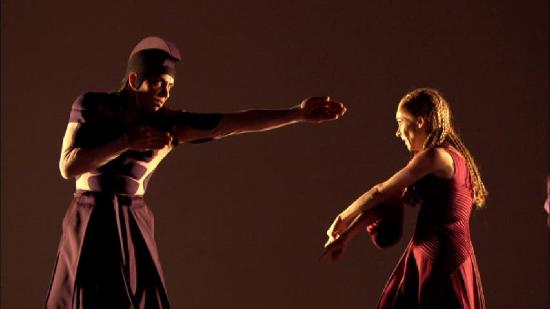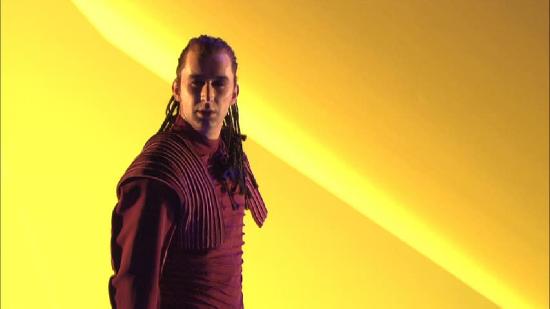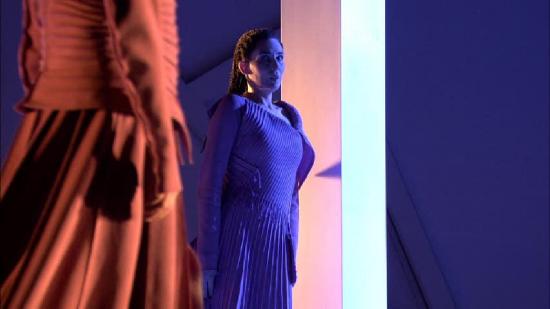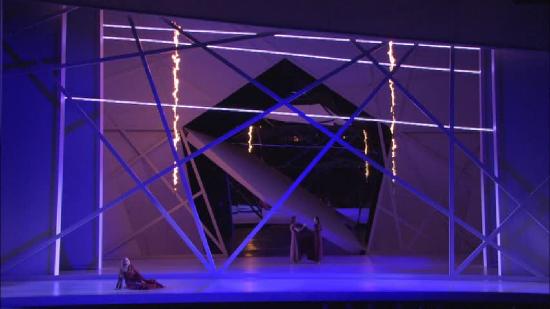Rameau: Castor et Pollux (Rousset)
Introduction
Another Rameau opera (or, to put it more correctly, Tragédie lyrique) appears within the Opus Arte DVD library, and is very welcome too. Being a product of pre-Revolutionary France, its subject matter is of course of Gods and various other mythological characters, all of which would have pleased those who first saw it, as they (mostly) considered their own aristocracy to be on much the same level.
The subject of his third large-scale opera is that of the love between two brothers, one mortal, the other immortal. Each makes huge sacrifices for each other, over and above the love one or t'other may have for any mortal woman, and they are both rewarded with immortality by their father (who just happens to be Jupiter) in that they are placed amongst the stars for eternity.
Well, that's the very short version of the story, which, in truth, is so convoluted that it makes certain Tolkien trilogies look like Janet & John books.
Video
An impressive NTSC picture that brings out the lights and shadows of Jean Kalman's lighting design and the colours of the costumes (mostly red) very well indeed. Sometimes there is a hint of glare on the faces of the cast, but this just helps to convey the generally austere feel to the whole set.
Audio
Very fine DTS setup which clearly brings out the incredible invention of Rameau's orchestration from the pit (in which the chorus have also been installed, and from which they sing marvellously), without losing any detail from the stage.
Extras
A relatively short (c.16 mins) film entitled 'To serve this big spectacle' is an interesting foray into the developement of the production, but for some reason, ends too suddenly, as if the DVD ran out. A missed opportunity.The accompbying booklet also contains a useful essay from Reiner E. Moritz on the origins of this work and some detail on this production in particular.
The ever-present 'Illustrated synopsis' helps enormously in cutting down the complexities of the plot.
Conclusion
Rameau was one of the great exponents of music-drama, and so was continuing the theatrical traditions of Ancient Greece well before Wagner himself developed the form using much the same plot lines of Gods, monsters, and various humanitarian traits.Here, Pierre Audi and his collaborators have created a fairly minimalist production, which 'humanises' all the characters, despite the mythological storyline, and so makes everything a little more believeable.
Rameau's music is always to the fore. His invention, both musically and instrumentally, is astonishing, sounding far more 'advanced' than the mid-18th century world from which it came, yet is still trapped inside the musical forms which were expected by society at the time.
Les Talens Lyriques play wonderfully, and the pace is whipped along nicely by Christophe Rousset (and his unnecessarily large bow tie).
The choreography by Amir Hosseinpour (being a French baroque opera, there are many dances of course) is unashamedly modern, but somehow fits in with the production in general, if not always the music itself. Often, Hosseinpour demands frantic movement which follows every note played rather than the whole phrase, and so this can jar with some of the more 'stately' dance on offer.
Each dance has been treated as a 'commentary' on how the main characters are feeling, and so we often see a 'double' for Castor, Pollux et al expressing innermost thoughts not brought out in the libretto. Overall, a fairly successful idea, and perhaps explains some of the more excitable moments I've just been complaining about.
Vocally, there is very little to complain about at all, so I won't.
Finnur Bjarnason (Castor) and Henk Neven (Pollux) are both very strong singers, each giving a sense of nobillity to their roles, and Anna Maria Panzarella as Télaïre is quite magnificent, especially in the Act II Tristes apprêts, pâles flambeaux which reaches emotional heights you would expect from much later music.
Véronique Gens as Phébé, the understandably peeved Princess of Sparta is equally as impressive, as is Anders J Dahlin, who plays three different roles, all of which have some pretty taxing music.
Despite the disappopinting main extra, a very strong case is made yet again for Rameau in Opus Arte's excellent series.




Your Opinions and Comments
Be the first to post a comment!